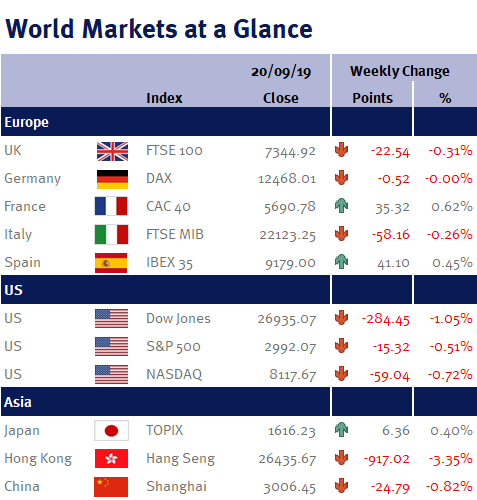After nearly 8 years as president of the European Central Bank (ECB), Mario Draghi will be stepping down at the end of October and handing over to Christine Lagarde, who is currently serving as President of the International Monetary Fund. Lagarde has recently been advocating for governments to use fiscal policy during times of economic weakness, however, this week was Draghi’s penultimate monetary policy meeting and he set out central bank policy to help support the European economy.
The ECB cut the deposit rate to a record low of minus 0.5% from minus 0.4%, whilst it also announced quantitative easing (QE) will resume from next month at a pace of 20bn euros per month. Draghi said the decision reflects a worsening economic outlook, mainly thanks to slowing global trade. The size of the deposit cut and the scale of the QE programme fell marginally short of expectations, however, disappointment was mitigated somewhat as the ECB committed to maintaining support for as long as necessary to reach its inflation goal of 2%.
Unfortunately, the bank’s commitment may prove short-lived as soon after the announcements, it was apparent several of Europe’s policy makers were not in favour of the latest easing package and with a new president from next month, there could be changes in the way the ECB conducts monetary policy. Although recent economic data in Europe has been disappointing and provides a strong case for the bank to remain accommodative. This week data showed Eurozone industrial production contracted more than forecast in July, with Germany reporting the largest fall with a 5.3% annual contraction. Germany is heavily dependent on exports and has been suffering from rising global trade frictions and slowing global economic growth.
In the UK, parliament was suspended on Tuesday, prior to which the UK government rejected Boris Johnson’s second attempt to call a general election. Sterling rebounded from last week’s lows of 1.20 by pushing through to 1.25 versus the US dollar, thanks in part to Scotland’s highest court ruling the suspension of parliament unlawful. Next week the Supreme Court will rule on the suspension and the government has pledged to abide by its decision.
Despite the political uncertainty, the UK labour market has continued to show resilience as the number of people out of work in the three months to July fell 10,000 versus the previous quarter and pushed the unemployment level back to 3.8%, the lowest since 1974. Wage growth also accelerated to 4% year on year, its fastest pace since June 2008.
Next week, central bank policy will continue to be in focus as the US, UK and Japan will all set monetary policy. With the US widely expected to cut interest rates again, there will be some disappointment if they fail to act.
Also next week, Boris Johnson will have his first face-to-face Brexit meeting with EU commission president Jean-Claude Junker and in terms of data, there is Chinese industrial production and retail sales, UK and Euro Area inflation and UK retail sales.
Peter Quayle, Fund Manager


